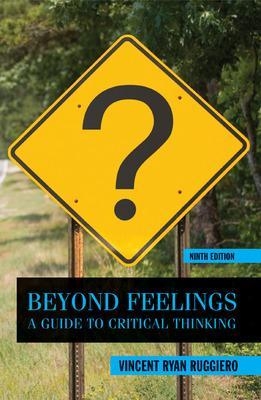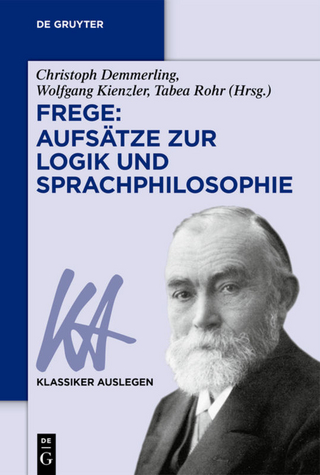
Beyond Feelings: A Guide to Critical Thinking
McGraw-Hill Professional (Verlag)
978-0-07-803818-1 (ISBN)
Vincent Ryan Ruggiero is internationally recognized as a pioneer in the movement to make creative and critical thinking central emphases in education and in society. The author of 22 books and over 500 essays, he is Professor of Humanities Emeritus at State University of New York, Delhi.
Preface Introduction PART I. THE CONTEXT 1. Who Are You?The Influence of Time and PlaceThe Influence of IdeasThe Influence of Mass CultureThe "Science" of ManipulationThe Influence of PsychologyBecoming an Individual 2. What Is Critical Thinking?Mind, Brain, or Both?Critical Thinking DefinedCharacteristics of Critical ThinkersThe Role of IntuitionThe Basic Activities of Critical ThinkingCritical Thinking and WritingCritical Thinking and DiscussionAvoiding Plagiarism 3. What Is Truth?Where Does It All Begin?Imperfect PerceptionImperfect MemoryDeficient InformationEven the Wisest Can ErrTruth Is Discovered, Not Created 4. What Does It Mean to Know?Requirements of KnowingTesting Your Own KnowledgeHow We Come to KnowWhy Knowing is DifficultA Cautionary TailIs Faith a Form of KnowledgeObstacles to Knowledge 5. How Good Are Your Opinions?Opinions Can Be MistakenOpinions on Moral IssuesEven Experts Can Be WrongKinds of ErrorsInformed Versus Uninformed OpinionForming Opinions Responsibly 6. What Is Evidence?Kinds of EvidenceEvaluating EvidenceWhat Constitutes "Sufficient" Evidence? 7. What Is Argument?The Parts of an ArgumentEvaluating ArgumentsMore Difficult Arguments PART II. THE PITFALLS 8. The Basic Problem: "Mine Is Better"Egocentric PeopleEthnocentric PeopleControlling "Mine-Is-Better" Thinking 9. Errors of PerspectivePoverty of AspectUnwarranted AssumptionsThe Either/Or OutlookMindless ConformityAbsolutismRelativismBias For or Against Change 10. Errors of ProcedureBiased Consideration of EvidenceDouble StandardHasty ConclusionOvergeneralization and StereotypingOversimplificationThe Post Hoc Fallacy 11. Errors of ExpressionContradictionArguing in a CircleMeaningless StatementMistaken AuthorityFalse AnalogyIrrational Appeal 12. Errors of ReactionAutomatic RejectionChanging the SubjectShifting the Burden of Proof"Straw Man"Attacking the Critic 13. The Errors in CombinationErrors of PerspectiveErrors of ProcedureErrors of ExpressionErrors of ReactionSample Combinations of ErrorsA Sensible View of Terminology PART III. A STRATEGY 14. Knowing YourselfCritical Thinking InventoryUsing Your InventoryChallenge and Reward 15. Being ObservantObserving PeopleObservation in Science and MedicineThe Range of ApplicationBecoming More ObservantReflecting Your Observations 16. Selecting an IssueThe Basic Rule: Less Is MoreHow to Limit an IssueSample Issue: PornographySample Issue: BoxingSample Issue: Juvenile CrimeNarrowing the Issue Further 17. Conducting InquiryWorking with Inconclusive ResultsWhere to Look for InformationKeeping FocusedHow Much Inquiry is Enough?Managing Lengthy Material 18. Forming a JudgmentEvaluating EvidenceEvaluating Your Sources' ArgumentsMaking Important DistinctionsExpressing Judgments 19. Persuading OthersGuidelines for PersuasionAn Unpersuasive PresentationA Persuasive Presentation Notes Index
| Erscheint lt. Verlag | 16.2.2011 |
|---|---|
| Zusatzinfo | 0 Illustrations |
| Sprache | englisch |
| Maße | 160 x 231 mm |
| Gewicht | 333 g |
| Themenwelt | Geisteswissenschaften ► Philosophie ► Logik |
| Geisteswissenschaften ► Psychologie ► Allgemeine Psychologie | |
| Geisteswissenschaften ► Psychologie ► Verhaltenstherapie | |
| Sozialwissenschaften ► Pädagogik | |
| ISBN-10 | 0-07-803818-9 / 0078038189 |
| ISBN-13 | 978-0-07-803818-1 / 9780078038181 |
| Zustand | Neuware |
| Haben Sie eine Frage zum Produkt? |
aus dem Bereich


